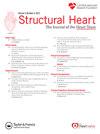新的完全可定位的IMPERIA输送系统在严重钙化主动脉狭窄或退行性外科生物假体患者中植入ALLEGRA经导管心脏瓣膜的首次人类经验:EMPIRE I研究的30天结果
IF 1.4
Q3 CARDIAC & CARDIOVASCULAR SYSTEMS
引用次数: 0
摘要
ALLEGRA (Biosensors International)经导管心脏瓣膜是一种自膨胀的牛心包主动脉环上瓣膜。设计了一种新的输送系统(IMPERIA™,Biosensors International),可以使阀门完全重新套套并重新定位在原位。这项上市前研究的目的是评估CE (Conformite Europeenne)标记的ALLEGRA瓣膜和新的IMPERIA输送系统联合应用经导管主动脉瓣植入术的安全性和有效性。方法于2023年1 - 11月在11个中心纳入137例患者。30例入组患者,91例意向治疗(ITT)人群,16例退行性手术主动脉生物假体。根据Valve学术研究联盟-2的数据,主要结果是ITT队列中从出院到7天的器械成功。结果136例患者(99.3%)成功植入ALLEGRA瓣膜。没有器械栓塞,也没有患者需要第二个瓣膜。91.9%的ITT队列获得了器械成功。30天时,原生主动脉狭窄(AS)组全因死亡率为2.2%,瓣膜组全因死亡率为0%。12.4%(17/137)的患者需要植入新的起搏器。121例先天性AS患者无患者假体错配(PPM), 2/16例瓣膜内配的患者有中度PPM。结论:本研究证实了经导管主动脉瓣植入的安全性和有效性,使用IMPERIA输送系统植入CE标记的ALLEGRA经导管心脏瓣膜用于重度钙化原生AS或退行性外科主动脉生物假体。本文章由计算机程序翻译,如有差异,请以英文原文为准。
First-In-Human Experience of the New Fully Repositionable IMPERIA Delivery System to Implant the ALLEGRA Transcatheter Heart Valve in Patients With Severe Calcific Aortic Stenosis or Degenerated Surgical Bioprosthesis: Thirty-Day Results of the EMPIRE I Study
Background
The ALLEGRA (Biosensors International) transcatheter heart valve is a self-expanding supra-annular bovine pericardial aortic valve. A new delivery system (IMPERIA™, Biosensors International) has been designed which allows the valve to be fully resheathed and repositioned in situ. The aim of this premarket study was to assess the safety and efficacy of transcatheter aortic valve implantation using the combination of the CE (Conformite Europeenne) marked ALLEGRA valve and the new IMPERIA delivery system.
Methods
One hundred thirty-seven patients were enrolled in 11 centers from January to November 2023. There were 30 roll-in patients, 91 in the intention-to-treat (ITT) population and 16 with degenerated surgical aortic bioprostheses. The primary outcome was device success according to the Valve Academic Research Consortium-2 from discharge up to 7 days in the ITT cohort.
Results
Implantation of the ALLEGRA valve was successful in 136 patients (99.3%). There were no device embolizations and no patient required a second valve. Device success was achieved in 91.9% of the ITT cohort. At 30 days, all-cause mortality was 2.2% in the native aortic stenosis (AS) cohort and 0% in the valve-in-valve cohort. New pacemaker implantation was required in 12.4% (17/137). There was no patient prosthesis mismatch (PPM) in the 121 patients with native AS and moderate PPM in 2/16 valve-in-valve patients.
Conclusions
This study confirms the safety and efficacy of transcatheter aortic valve implantation using the IMPERIA delivery system to implant the CE marked ALLEGRA transcatheter heart valve in patients with severe calcific native AS or a degenerated surgical aortic bioprostheses.
求助全文
通过发布文献求助,成功后即可免费获取论文全文。
去求助
来源期刊

Structural Heart
Medicine-Cardiology and Cardiovascular Medicine
CiteScore
1.60
自引率
0.00%
发文量
81
 求助内容:
求助内容: 应助结果提醒方式:
应助结果提醒方式:


